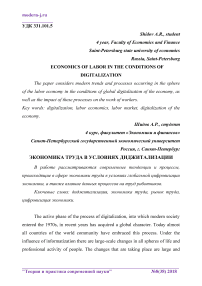Экономика труда в условиях диджитализации
Автор: Шидов А.Р.
Журнал: Теория и практика современной науки @modern-j
Рубрика: Основной раздел
Статья в выпуске: 8 (38), 2018 года.
Бесплатный доступ
В работе рассматриваются современные тенденции и процессы, происходящие в сфере экономики труда в условиях глобальной цифровизации экономики, а также влияние данных процессов на труд работников.
Диджитализация, экономика труда, рынок труда, цифровизация экономики
Короткий адрес: https://sciup.org/140273750
IDR: 140273750
Текст научной статьи Экономика труда в условиях диджитализации
The active phase of the process of digitalization, into which modern society entered the 1970s, in recent years has acquired a global character. Today almost all countries of the world community have embraced this process. Under the influence of informatization there are large-scale changes in all spheres of life and professional activity of people. The changes that are taking place are large and deep, and their impact on the work of workers is becoming more and more significant.
In conditions of digitalization of the economy, the labor market undergoes enormous changes. Even today you can observe how slowly, but still disappear such professions as an accountant, lawyer, economist, the demand for IT specialists, engineers is growing. Experts predict that about 50% of professions will disappear in the next 10 to 20 years. This factor can lead to social inequality and an increase in the number of unemployed. It is necessary to carry out a wellthought-out policy related to education, to react quickly to changes in the external environment and technological challenges: to develop comprehensive programs for the retraining of personnel and continuing education. Another substitute for some professions may be robots.
Robotics, in the first place, will replace the category of "maintenance personnel". Already today in any large city you can find terminals with coffee and food, vending machines for paying parking, self-service points in different areas, etc. The development of unmanned vehicles poses a threat to a large number of drivers around the world. Most of the professions that actively offer the labor market at the present time will exhaust their potential and significance. Thus, the "extinction" of professions in the period of digital transformation makes it necessary for the state to develop a new program that will act as a link between the demand / supply of the labor market and digital literacy of the society. In the author's opinion, Russia has a high potential of human capital (qualifications, knowledge and skills of people), which is an important resource of economic growth.
Another trend in the labor market is related to the fact that since the beginning of the 20th century the information flow has increased approximately 35 times. Annually in the world it is published over 100 thousand magazines in 60 languages. This means that today a specialist needs to read hundreds of thousands of pages of scientific text daily in order to keep up with modern requirements.
The prospect of transition of the economy to an innovative level is as follows: in the sphere of high technologies, it is necessary to combine material resources (application of new technologies in production) and intellectual (to enable people to create and implement creative ideas).
The labor market needs the creators, people, and cadres who are able to think creatively. A person deprived of creative and computational thinking may prove to be an unnecessary element in the world of "smart things". The conditions of the organization of work, is focused on motivation of workers and improvement of professional skill, continuous training and requalification. It is necessary to implement this through the extensive introduction of network sharing of best practices, digital training techniques. A major technological shift, which began in industry today, will be completed by 2025. The robotic industry of the future will be able to provide the population with all the necessary industrial products.
Production in most cases will not need people, they will be necessary for the sphere of "human-oriented" services, as robots in the near future will not be able to replace creativity, invention, design, programming and maintenance of themselves, organizing and setting up production. Technologies of labor globalization will be developed, the base of which will focus on online management of robotic equipment (bots). Every citizen who wants to work will make use of the unified man-machine interface of remote access. This process will be controlled by cloud structures. To manage the bots will require a large number of online operators, it will be in demand and prestigious intellectual work for women, the elderly, teenagers and persons with disabilities.
Thus, in the future all more or less difficult physical work will be performed using intelligent robots and online-controlled bots. People will provide control over the activities of robots through online management, helping them in difficult situations.
The introduction of digital technologies in various spheres of society will increase the effectiveness in managing any aspect, as well as transparency of actions and reduce corruption opportunities. The era of change will require rapid knowledge management, due to the need for lightning focusing not only on creating new knowledge, but also on their implementation and application.
Список литературы Экономика труда в условиях диджитализации
- Introduction to the digital economy // Sretensky Club named after SP Kurdyumov - URL: http://spkurdyumov.ru/main/vvedenie-vcifrovuyu-ekonomiku-na-poroge-cifrovogo-budushhego
- Popov, EV Specifics of managing the development of the digital economy / EV Popov, KA Semyachkov // Management in Russia and Abroad. - 2017. - No. 2. - P. 54-61. URL: https://science.urfu.ru/ru/publications/особенности-управления-развитием-цифровой-экономики


